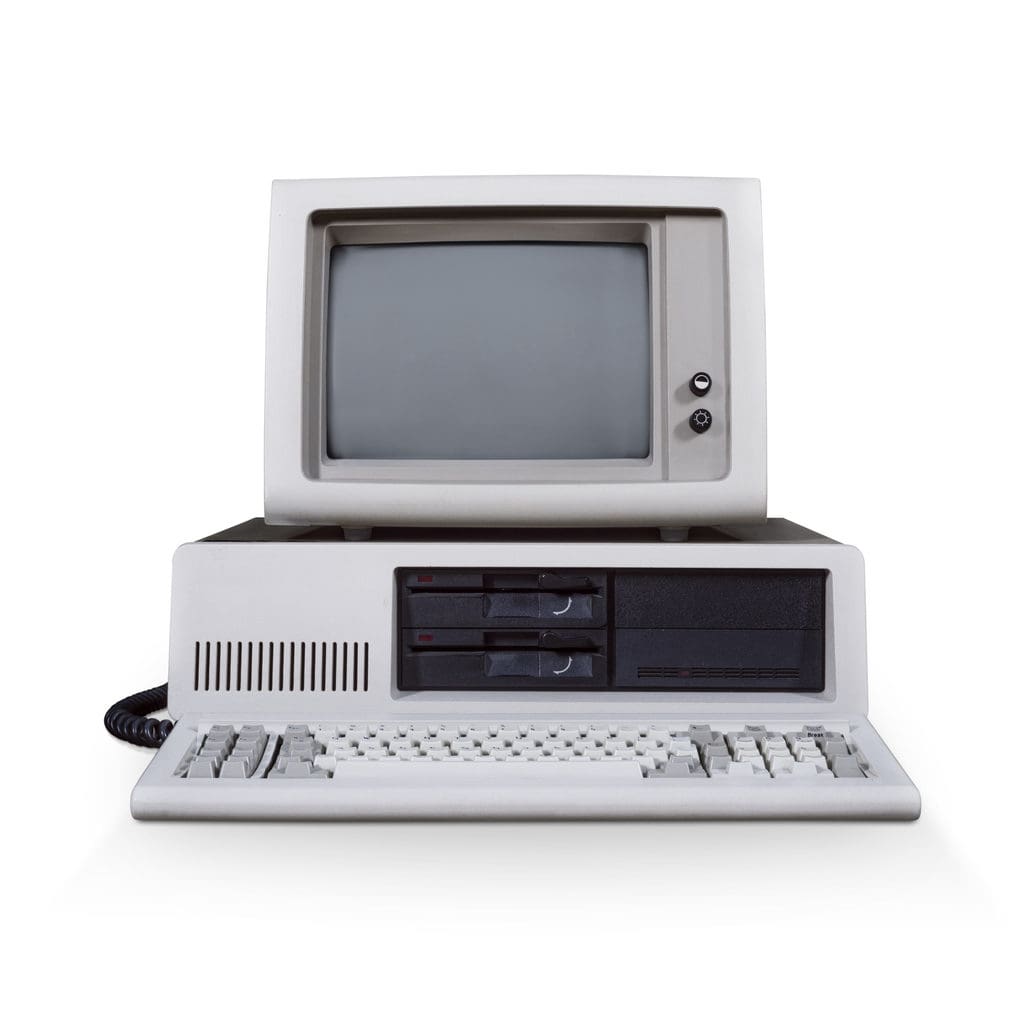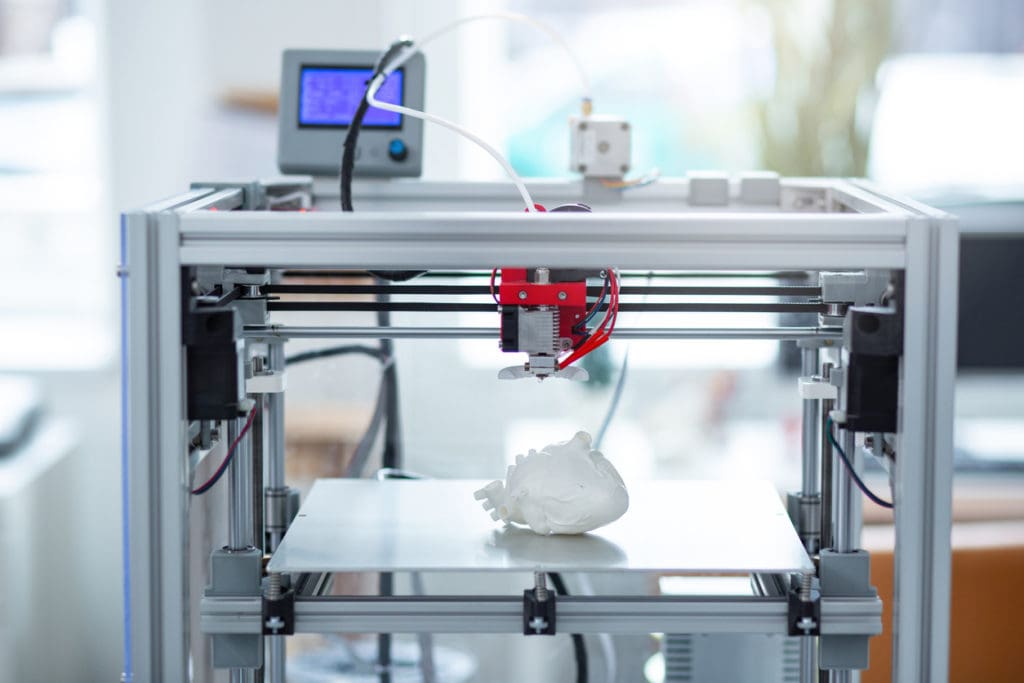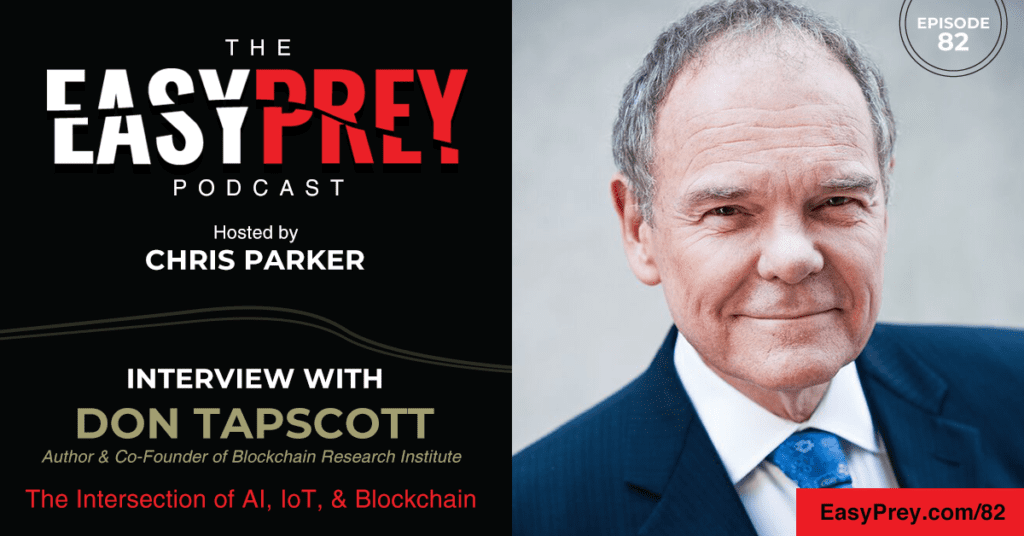
Fear can cause people to hoard. Blockchain would allow transparency that could alleviate those fears. Understanding the trivergance of AI, IoT, and Blockchain can transform your thinking even for those resistant to change.
Today’s guest is Don Tapscott. Don is one of the world’s leading authorities on the impact of technology on business and society having authored 16 widely read books, including the global bestseller Blockchain Revolution: How the Technology Behind Bitcoin is Changing Money, Business, and the World, now translated into 20 different languages. He is currently Co-Founder & Executive Chairman of the Blockchain Research Institute, an Adjunct Professor at INSEAD, recently a two-term Chancellor of Trent University in Ontario and Member of The Order of Canada.
“There is a big need in a paradigm shift like this for leadership.” - Don Tapscott Share on XShow Notes:

- [1:22] – Don shares his professional background, career, and work as an author.
- [2:55] – The Blockchain Research Institute researches how industries are affected by blockchain technology.
- [4:41] – Don and Chris think back to the earlier days of the internet.
- [7:02] – This new generation of technology represents a new paradigm.
- [8:04] – What is happening in Congress at the moment that could change everything about the industry?
- [11:35] – New paradigms create a crisis in leadership. Don’s life work has been to find leaders who embrace the shift.
- [13:12] – We view this current time as the second era of the internet. What is different from the previous era?
- [14:23] – We are moving from an internet of information to an internet of value.
- [15:21] – People hoard out of fear and this impacts supply chains.
- [17:09] – Blockchain can be a solution for health records. Many people consider it a problem due to lack of understanding.
- [18:25] – Blockchain gives people the control to manage their transparency.
- [20:29] – It takes time for us as a society to figure things out. What is the future of blockchain?
- [22:19] – Don is speaking at an event about the vision of how industries will be changed by blockchain.
- [24:43] – Don references years past when CEOs didn’t type because that was a secretary’s job. It took time to change and it will take time to make these changes as well.
- [26:06] – There are industries that will be very resistant to change.
- [26:51] – On the Blockchain Research Institute’s website, there are reports on various industries.
Thanks for joining us on Easy Prey. Be sure to subscribe to our podcast on iTunes and leave a nice review.
Links and Resources:
- Podcast Web Page
- Facebook Page
- whatismyipaddress.com
- Easy Prey on Instagram
- Easy Prey on Twitter
- Easy Prey on LinkedIn
- Easy Prey on YouTube
- Easy Prey on Pinterest
- Don Tapscott Web Page
- Men In Suits Music Web Page
- Blockchain Research Institute Web Page
- Don Tapscott on Facebook
- Don Tapscott on Twitter
- Don Tapscott on Instagram
- Don Tapschott on LinkedIn
- Books by Don Tapscott
Transcript:
Can you give me and the audience a little background about who you are and what you do?
Who I am, what do I do? Well, professionally, I guess it’s because I do other things. I'm in a band called Men in Suits.
Nice.
Yeah, we're a charity band. We've probably raised $5-6 million for good causes. But setting that aside, professionally, I started studying the digital age when I was working for Canada's Bell Labs in the 1970s. I know I'm dating myself here. It was Bell-Northern Research. We had this crazy idea that everybody would use a computer and it'd be connected to a vast network of networks. Back then, the only people who used computers were programmers. Secretaries didn't even use computers.
 I wrote a couple of books. We did a lot of research. I wrote a couple of books in the 1980s on that experience. My mother bought most of the copies. But I started writing some bestsellers in the early ‘90s. Paradigm Shift in 1993 was obviously a big book, and The Digital Economy in 1994 was one of the first bestsellers about the web.
I wrote a couple of books. We did a lot of research. I wrote a couple of books in the 1980s on that experience. My mother bought most of the copies. But I started writing some bestsellers in the early ‘90s. Paradigm Shift in 1993 was obviously a big book, and The Digital Economy in 1994 was one of the first bestsellers about the web.
Based on that, I set up a think tank. We do syndicated research. Meaning, we get a bunch of companies that put some money, $150,000-$200,000 into a pot each. We have millions of dollars and then we investigate something. We've done a dozen of these big programs over the years and they’ve led to a bunch of other big books—Wikinomics, The Naked Corporation, Growing Up Digital, and so on.
My most recent incarnation of this is the Blockchain Research Institute where we have 80 companies. We're doing 130 projects investigating how the trivergence—you heard it here first—the convergence of blockchain, AI, and the Internet of Things is changing business and society and what are the big challenges in getting there.
That's amazing. My internet history starts in the mid-90s, working for a company that back in the fast days, a T1 internet connection. We brought our mail order computer catalog and went online in the early 90s. This was the amazing new internet, and I’m maybe not necessarily a child of the internet, but an adult of the internet.
Yeah, T1 was blazing fast back in the day. We started at 1200 bits per second. Then we got to 9600 bits per second, and that was raging. Of course, now we're many hundreds.
I think my first modem was on a Commodore 64, Commodore 128, a 300 baud modem, where it took four or five minutes to connect to the internet service provider.
Actually, I remember 300 bits per second. Now that I'm pushing the dark recesses my mind and pull one out. In the 1970s, I had a computer in my home connected to a modem. It was a dumb terminal. We did these controlled experiments where we had 50 people who essentially got Microsoft Office. This is 1979 on a dumb terminal. We built it. Then we have 50 people using telephones, paper diaries, and calculators, secretaries, and typing pools—all the rest of that.
People who use the technology worked very differently. They had more fun. But the big thing was they communicated differently. -Don Tapscott Share on X
We found that the people who use the technology worked very differently. They had more fun. But the big thing was they communicated differently. So I said, I think computers are going to become a communications tool. For at least half a decade, a lot of people made fun of me saying that managers and professionals will never use computers, and they certainly will never be a communication tool.
Now, it's ubiquitous communication.
Yeah.
People don't make phone calls anymore. It's texting, emailing.
Yeah, well, not to go too far down memory lane. You know the big reason people said that managers will never use computers?
No, I don't. Tell me.
 Managers will never learn to type. I would do an executive briefing and I would have people say to me, “Do I look like a secretary to you? There's no way I'm ever going to learn how to type.” If you were a manager and you sat down at a typewriter in the office, “Hey, Bob. Is your secretary dead or something?” It was such an unthinkable thing that a manager or a professional would put their hands on a keyboard. It's hard to imagine that today, of course—CEOs type with their thumbs into devices.
Managers will never learn to type. I would do an executive briefing and I would have people say to me, “Do I look like a secretary to you? There's no way I'm ever going to learn how to type.” If you were a manager and you sat down at a typewriter in the office, “Hey, Bob. Is your secretary dead or something?” It was such an unthinkable thing that a manager or a professional would put their hands on a keyboard. It's hard to imagine that today, of course—CEOs type with their thumbs into devices.
Do you see that almost the societal influence being the more difficult change when it comes to technology advancement? Are the people at the top going, “I'm not going to type” as being the thing that's holding things back, or is it kind of rolling over everybody?
That's always been the case. This new generation of technology—the trivergence—represents a new paradigm. A paradigm is a mental model, and it puts boundaries around what we think constrain our actions. They're often so strong that we don't know that they're there. The Earth is at the center of the universe. The big problem in the world is communism. Remember that one?
A paradigm is a mental model, and it puts boundaries around what we think constrain our actions. -Don Tapscott Share on XThe purpose of computing is to automate existing business processes with the goal of reducing headcount. Secretaries type and something can happen in art, science, culture, technology, whatever the causes of change to occur. When that happens, these things are received with coolness, or worse, because they cause disruption and dislocation. Vested interests fight against change.
As we record this, there's this searing evidence of what I just said going down in the US Congress where as part of the infrastructure bill, they want to pass a law that would tax and cause various players in the industry to report all of their transactions to governments for taxation purposes with the goal of raising $28 billion from the infrastructure bill. This would include people like miners, proof-of-stake validators, decentralized exchanges—all of whom would have absolutely no way of complying with this law. If they push forward with this law—which hopefully they will not in a strict way—this would wipe out the industry in the United States.
This deep lack of knowledge about how this decentralized finance world works by our government is threatening to kill the innovation economy in the United States. People have not really noticed this right now, but the flack is really hitting the fan. And I'm very hopeful that there will be some kind of compromise amendment to that. If you're a centralized crypto exchange like Coinbase, do you know who your customers are? Sure, you should report them. That's a good law. People ought to pay their taxes. Nobody's trying to evade taxes here.
But if you're working as part of this vast network that enables clever code and cryptography to achieve trust, to create assets, to clear and settle transactions and keep records, and so on—the network does that. You can't possibly comply with a law like that. There's a big need when you have a paradigm shift like this from leadership, and we're starting to see some leadership in Congress, which is very positive.
Do you think that, historically—I’m trying to think of where there have been other cases where you have politicians that don't necessarily understand the technology. So when it comes to writing laws about it, they don't even know what it was.
History is rich with such stories. In the early days of the automobile industry in the UK, the regional government adopted the red flag laws, which meant if you're going to go on a horse’s carriage, you’ve got to have a driver, a navigator, and a guy up front walking and carrying a red flag. I remember proposals in the early days of the internet that anyone who had an IP address needed to have a CB license. So what we have today is the equivalent of ISPs having to report on every single activity that occurred on the internet back in the early 1990s.
It's just obscure. History is just full of great examples of people’s famous last words. People who said, “No, no, no, they didn't understand the paradigm.” Again, I'm old enough to remember in the early ‘80s when Ken Olson—who was the CEO of Digital Equipment Corporation, which was neck and neck with IBM for being the biggest computer company in the world—said, “There's no way that anyone would need a computer in their home.” That goes down in the category of famous last words.
This is a big problem. New paradigms cause a crisis of leadership. And to get to your question, this is my life history of trying to find the leaders that can embrace a new paradigm to make them happen.
Do you see lawmakers now, or at least their staff now, starting to have a better understanding of tech, at least in terms of legislating responsibly and appropriately?
Yeah. There are lots of really good examples of actual members of Congress that get this. We've got senators Wyden, Toomey, and Lummis who proposed an amendment to narrow the definition of a broker as part of this legislation. And this shouldn't be a partisan thing. They're all Republicans, but Democrats should be just as on board with this because we all have common interests—advancing an innovation economy.
From my writings, my recent TED talk, and public stuff like that, we view this as the second era of the internet. The first era we had for 40 years was the Internet of information. But if I send you some information, a PDF or photo, I'm actually sending you a copy. Now, it works great for information, but it doesn't work great for assets like money, securities, deeds, contracts, identities, intellectual property, art, music, or votes and assets—something of value that belongs to somebody.
Copying those is a bad idea. You don't want someone copying your vote or your identity. And if I send you a million dollars, it's really important that I don't still have the money. That's what blockchain solves. It enables people to trust each other, peer-to-peer, and trust is not achieved by a bank, a stock exchange, a broker, or a social media company. It's achieved by cryptography and some clever code.
We’re moving from the internet of information to an internet of value. This is a truly transformational and historical development. Countries where government leaders don’t get this right are really going to hurt themselves moving forward.
In what ways do you see the countries hurting themselves when the political leadership isn't on board?
Pick an industry, it's going to suffer. Supply chains. This is a transformational technology. Think about it. First of all, a pandemic shows weaknesses in our supply chains. Very structural. Still today, we’re all stuck, all these things we can't get. This is 18 months later. People hoard. Why do people hoard? They hoard out of fear and lack of transparency. If we had supply chains that revealed information, nobody's going to buy three years of toilet paper if you know some more are coming tomorrow.
Our systems for health data. This is part of why this pandemic happened. All our health data, which includes real-time stuff now, is buried in all these silos. If we had a universal blockchain-based health record where anonymized data can be shared, we could be fighting public health problems like a pandemic.
A supply chain—you’ve got trains, boats, planes, trucks, various agents, escrow agents, borders, and tax authorities using all these traditional systems like EDI and ERP. There’s paper flying around everywhere, faxes, people making phone calls. Imagine if that were a shared network state, a single version of the truth, real-time transactions. There would be no payment and settlement period of three days because the payment and the settlement are the same activity. It's just a change to the ledger.
This can revolutionize our entire economy. That's one of 50 industries in areas that we’re investigating at the Blockchain Research Institute.
We’re moving from the internet of information to an internet of value. A truly transformational and historical development. -Don Tapscott Share on XYou talked about health. Do you see pushback from the public on bringing health records on the blockchain for fear of—if it’s about transparency, you want transparency between your health care providers being able to see all your medical records—the government knowing your health history. People now are going to charge you more because of your health history. How do you balance that kind of transparency and privacy?
Blockchain is not the problem, it's the solution. Right now the problem exists. Our health records are communicated in violation of our basic rights to privacy all over the place. Now, there are all kinds of examples of someone that went through a series of job interviews and looked really good. They did a reference check. They know their references are awesome. They didn't get the job and failed the reference check. Someone found out that they've taken medication for depression or something like that.
Plus the fact that all these systems are based on central servers so they can be hacked, and they are. Our health records are always being released. There are two types of these servers—those that have been hacked and those that will be hacked. The thing about blockchain is you can have your cake and eat it too. You can have appropriate transparency where you, as a user, get to decide who you're going to reveal to what as part of a self-sovereign healthcare record.
Maybe I’m going to say, “If I'm found unconscious somewhere, I will provide all pertinent health information to any certified health care professional.” Check. You could manage your transparency. But you might also say, “I'm going to anonymize my history with leukemia, and I want to make that available for science. I’d like to sell it to Pfizer anonymously, and I'd like them to pay me for it.” Or, “I'd like to get a second opinion and ship that off to another doctor or another institution.” We can manage our own privacy and have secure and private systems, but we can also manage appropriate levels of transparency as well. Only blockchain can deliver that.
As you're talking, I was thinking of privacy settings on our apps and on our social media accounts and wondering if people that have a hard time understanding what I'm sharing with a friend and what I'm sharing with the world on Facebook, are they going to be able to transition to handling the privacy of health data? Each of those different checkboxes for what I'm willing to share under what circumstances, or is that just part of that sociological change that has to happen?

Well, I think it's a fair enough point. This is not all just going to happen. They're going to be created by people everywhere—by the technology companies that do this, by wise and smart government leaders that understand the opportunity, by civil society organizations that are fighting for our rights, and as individuals as well. It takes time for us to figure stuff out.
Right now, you’ve got a third of the American population that thinks that the most scrutinized election in American history was fake. And they think that based on something that somebody said, as opposed to looking at all of the evidence. People will do and think about what they want to do, and it's going to require a big process of engaging people to understand what needs to be done.
It's not like the internet—what we've seen in the last 40 years—it's not like that happened all in three minutes.
No. Yeah, exactly.
So the trivergence of blockchain, AI, and the Internet of Things. It's not like we haven't set the calendar for December 31, 2021. January 2022 everything changes.
Exactly, right. You know what, over the years we all learned to type.
Yup. Even if only with our thumbs. What industries do you know that have not adopted blockchain, are next in line to start implementing blockchain on an industry-wide scale?
Well, everybody's adopting it at different levels. There's a lot going on that is just not publicly known. Some big companies are pretty proprietary about this stuff because they know it's going to deliver a big advantage to them. You just pick an industry.
I'm excited. In the first week of September, I'm going to get on an airplane. I'm going to use them to get the first face-to-face speech I've given in a while to what was called the Oil & Gas Blockchain Consortium. It's now called Blockchain for Energy, something like that. There'll be pretty much every big oil company, at least in North America. A lot of them in the world there. I'm the opening speaker, and they asked me to just lay out a vision on how this industry will be transformed, and I'm doing that.
There are others that have been slow. The telecom industry you’d think would have been one of the first up for this, but it's a problem of leaders of the old paradigm. They think about the world in terms of information, not in terms of assets. So they're missing a lot of opportunities there. Pick any industry and I can tell you where it's at, what are the good things that are happening, and were there impediments.
I'll tell you one thing though, that a lot of people say, “Is this really happening? Because it sure seems like it's taking a long time.” To your earlier point, it is taking a long time. You know what? These are big changes. Today, you want to do something with the internet—you want to sell some stuff online, create a company? Call up Shopify, they have a rep, send you a bunch of stuff, you sign a thing. Three days later, you're buying and selling with a great dashboard on who's buying everything all around.
You want to implement a blockchain to transform manufacturing? You're talking about changing the deep structure and architecture of the corporation. You're talking about the trivergence where you’ve got AI and additive manufacturing. The internet of things with 3D printing. You're Boeing; you're going to be printing parts in a factory remotely.

We're also talking about transforming the whole manufacturing supply chain, of which you are just one player. So you get all your partners involved. You’ve got to have a standard. You’ve got to agree. What’s a bill of lading? What's an invoice? This is going to take a while. The reason is not because blockchain is unimportant. The reason is it's so transformational you're messing with very profound institutions, structures, and processes that are at the heart of our entire economy. We just take financial services.
Now DeFi, most of what banks do today can be done by software. Now, they're not going to be replaced because they’re the smart ones and figured that out. They're all over this trying to create new value in the middle, which they will do, and some will be successful and some will disappear. I called it re-intermediation in the digital economy—the creation of new value in the middle. That was one of those terms that never caught on. I thought it was a good term in 1985. But maybe nothing so powerful is a term whose time to be coined has come there. It created a new law.
I definitely see that there are industries that will be resistant to change. I spent probably 15 years associated with the life insurance industry. They are, even to this day, very paper-based. It’s, “Oh, no, no, no, we have our processes that have worked for the last 100 years with life insurance. We're going to keep doing these things.” I've worked with some people that are trying to push up against that envelope of like, “No, you've got to change.” Some industries are just very, very resistant to that change.
Well, go to blockchainresearchinstitute.org. We've released a bunch of reports under Creative Commons, including a couple about the life insurance industry where you can read about the actual changes that are happening.
The other thing is Alex Tapscott, my co-author on Blockchain Revolution, also a relative—my son. We have had this unbelievably joyous collaboration. He's got a new book called The Financial Services Revolution, relatively new this year. It's available on Amazon. It digs into all the different aspects of the financial services industry as well.
That's going to be an interesting one to see when some of these really old 100-year-old companies that have not caught up with the digital age are either going to have to change very rapidly, or they're going to get eclipsed by some younger company. “Hey, we don't want to do it the old way. And rather than having to rebuild everything that exists, we're just going to start from a tech beginning, and this is going to go a lot faster than some of these entities are used to moving.”
Anyway, great to chat with you.
Great to chat with you as well. For those that are interested in your Men in Suits band and the charities that you help raise money for, where can they find out about that?
The website is meninsuitsmusic.com and the Blockchain Research Institute is at the blockchainresearchinstitute.org.
Are you on social media and able to be found on social media?
Oh, yeah. I'm @dtapscott on Twitter. I also have public Facebook and Instagram pages as well. They're easy to find.
We'll make sure to link those in the show notes. Don, thank you so much for coming on the Easy Prey Podcast today.
Great chat, and thanks so much.
Thank you, Don. Have a great day.


Leave a Reply